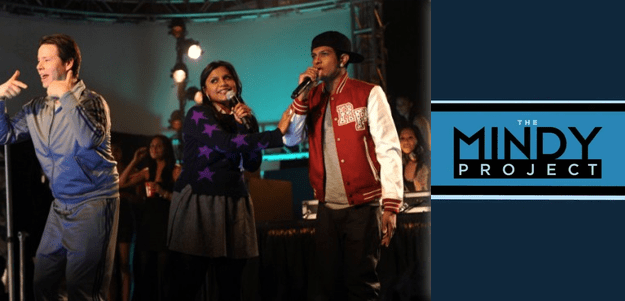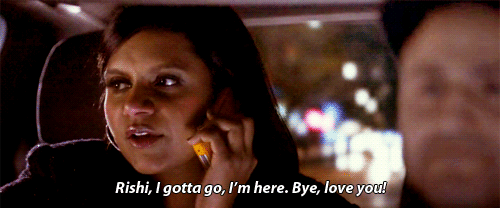This article was originally published at Racialicious.
Mindy Kaling’s show, “The Mindy Project,” wrapped up its first season last Tuesday. In its first year, the show picked up critical attention and found an audience. More importantly, the show found confidence and its voice, and it developed characters and relationships true to Kaling’s signature comedic style. While the majority of the main cast is white, the show cast Utkarsh Ambudkar to play Rishi, Mindy’s little brother, for a couple of episodes in the first season.
Rishi is a hilarious, complex, and multifaceted character, a strong role for an Indian American male. He can be considered “The Mindy Project’s” take on the emerging stereotype of an Indian American “faux-gangster” male. Although he is studying science at Stanford University, Rishi is more interested in moving to New York City and becoming a rapper. Interestingly enough, Rishi isn’t just a “typical American kid trying to make it in a creative field,” a trap that many writers who want to normalize the minority experience fall into. He’s actually cool. Instead of being another corny wannabe, Rishi is a great rapper who can command a room, be it a break room full of Mindy’s coworkers or a “Battle of the Rappers.”
“The Mindy Project” does a great job of making Rishi more than his ethnicity without ignoring it. Jokes about Indian Americans have punch lines that make mainstream society and its misunderstanding of minorities the butt of the joke, not the minority Indian Americans. For example, Rishi manages to convince Mindy’s building manager to let him into Mindy’s apartment because “a well-spoken Indian can get into anywhere he wants.” This is a play on the idea that Asian Americans are stereotypical “model minorities.”
“The Mindy Project” highlights the need for giving minorities the opportunity to create art for a broader audience. When minorities are placed in leadership roles, more multi-faceted minorities of all types emerge on-screen as well. As a black woman, Shonda Rhimes successfully made the “Grey’s Anatomy” cast diverse without sacrificing quality. When minorities create media, they pay more attention to giving nuanced portrayals of people of color. Though the episode “Mindy’s Brother” was written by Chris McKenna, a white male, Mindy Kaling’s presence and influence is obvious. With an Indian American woman in charge and in the lead role, it becomes much more difficult to reduce her character and the role of her brother to stereotypes.
This is especially important in the realm of television sitcoms and comedy. Tired and overplayed racial stereotype jokes have been a constant presence for too long with “Mean Girls” and “Pitch Perfect” only minor examples in a long lineage. Sitcoms have a long history of portraying Indians, Indian Americans, and Asian Americans as background characters that are used to further the experience of the mostly white main characters. Anyone remember “Outsourced“? Kaling has stated that she does not think of her work in political terms and that talented writers can write for anyone. However, it’s hard to look at characters like Rishi and deny that the backgrounds of writers shape their scripts.
Recently, it was announced that Xosha Roquemore, a black actress, will be joining the cast in the second season as a series regular. The news demonstrates a commitment by the show to have a truly diverse cast. While her role in the first season was limited, “The Mindy Project’s” track record is a reassurance to viewers that Roquemore’s Tamara will be further developed and treated with a certain level of respect.
As this primetime television season wraps up and pilot season hits its stride, television networks have already started announcing series renewals and new series pickups. “The Mindy Project” has already been picked up for a second season. For both current shows and possible new shows, it is absolutely imperative that television executives not only pay attention to ratings and the strength of ideas but also look to the people in charge. The new slate of freshmen series looks somewhat promising; ABC Family, for example, has green lit “The Fosters,” which is being produced by Jennifer Lopez and tells the story of a bi-racial lesbian couple. Minorities need visibility on screen, but they also need autonomy behind the camera. Only with more minorities in charge of writing rooms can minorities really achieve true visibility — flaws, strengths, and all.
Crystal Leww is a writer living in Chicago. She blogs about music and culture on her personal blog and tries to make people smile on Twitter.















I think next season Rishi needs more air time, more episodes, and def a chance to show off his “Skills” Utkarsh is amazing!!!!
While Kevin G from Mean Girls was pretty stereotypical (Asian kid leading the math team, no one saw that coming /sarcasm), I didn’t think that was true of Donald. His role is small, but I didn’t notice anything stereotyped about it.
I’m glad that Xosha Roquemore is joining The Mindy Project, but I hope her character doesn’t continue to be the African-American knock-off of Jess from New Girl (sings about what she’s doing, etc.) because OMG THAT IS ANNOYING. Overall I would love to see The Mindy Project get back to some of the socioeconomic issues around medicine that were promisingly hinted at in the pilot but haven’t panned out in the show so far. It’s still one of the best sitcoms on TV right now, but I think it has even greater potential than what’s been tapped.